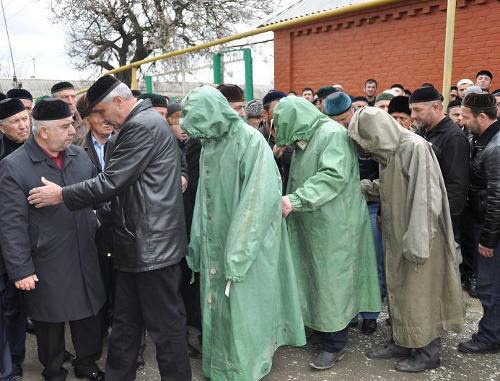Chechen authorities report elimination of 'blood feudists' in the republic, but set up new Reconciliation Commission under Muftiat
According to a number of local experts and observers, statements of the Chechen leadership about complete elimination of blood feud conflicts in the republic can be incorrect. At the same time, on the next day after Kadyrov announced abolition of the Commission on reconciliation of families who were in the state of blood feud, the National Reconciliation Commission was established under the Spiritual Administration of the Republic. In future, among other tasks, the Commission will be engaged in reconciliation of 'blood feudists' (blood feud avengers).
"Reconciliation of 451 families means saving of hundreds or even thousands of human lives"
"Today, we can say with confidence that the Commission succeeded. There are no blood feud conflicts in the republic anymore," announced Kadyrov. According to him, during the period from August 2010 till this mid-October, 451 blood feud conflicts were reconciled in Chechnya.
The Spiritual Administration of Muslims of Chechnya states that the number of resolved blood feud conflicts included the cases of 50-year-old, 80-year-old, and even 100-year-old conflicts.
"In this January, in Itum-Kale District efforts of the committee members resulted in reconciliation of two families who had been in the state of blood feud since 1905, that is, 106 years. Reconciliation of 451 families means that, due to our efforts and, above all, due to Ramzan Kadyrov, we managed to save hundreds or even thousands of human lives. At present, there are practically no blood feud conflicts in the republic anymore. This is certainly a great achievement, which has no parallel in history," declared the Muftiat of Chechnya.
In this case, the work on the reconciliation of families who were in the state of blood feud would not be stopped with abolition of the Commission for reconciliation of 'blood feudists' headed by Ramzan Kadyrov. This was told to the "Caucasian Knot" correspondent by Musa Dadaev, the deputy head of the Spiritual Administration of Muslims (SAM) of Chechnya.
"On October 18, the National Reconciliation Commission has been established under the SAM. In future, among other tasks, the Commission will be engaged in reconciliation of 'blood feudists'," stated Musa Dadaev.
"We cannot speak about complete elimination of blood feud conflicts in Chechnya"
According to the local experts, statements of the Chechen leadership about complete elimination of blood feud conflicts in the republic can be incorrect, and reconciliation of the parties being in the state of blood feud forced by the authorities may lead to new cases of hostility in future.
"Of course, we have substantial progress in reconciliation of 'blood feudists' in our republic, we should admit it. However, if anybody states that there are no 'blood feuds' in the republic anymore, it would be an obvious exaggeration. Tens of thousands of Chechens left the republic last years, and this number includes at least several dozens of 'blood feudists'. For example, I know a family which last year left Chechnya, when authorities began to put pressure on the family members, demanding to forgive the murderer of their close relative. And such cases occur not very seldom," the "Caucasian Knot" correspondent was told by the head of a Chechen NGO, who preferred to remain anonymous.
According to him, the republic constantly faces emergence of new reasons for blood feud, including recent murder of three field commanders of Chechen militants occurred in Istanbul. "Among the persons involved in the murder, the media have named the name of a specific person, a Chechen native. And this fact may already lead to declaration of blood feud against the man," said the NGO's leader.
He also points out to the fact that road traffic accidents take human lives in the republic practically every day. "If a participant of this fatal road traffic accident is caught in the fact that he has been in a state of alcoholic or drug intoxication at the time of the accident, it also may be a serious reason to declare a blood feud. Therefore, we should not hurry up in considering advantages of complete and final reconciliation of blood feud conflicts," believes the interlocutor of the "Caucasian Knot" correspondent.
Another expert reminds the fact that the tradition of blood feud exists in Chechnya for hundreds of years, and even the USSR failed to eliminate it. "At present, we also cannot do it completely, no matter what anyone says. I do believe that our authorities need reconciliation of 'blood feudists' to help staff members of local law enforcement agencies involved in killings of people to escape possible inevitable impending retribution," believes an observer, who also preferred to remain anonymous.
According to him, 'old' blood feud conflicts, which lasted from the time of the Soviet Union, could number a maximum of several dozens of cases. "Most of the blood feud conflicts appeared in the last 15-20 years. And in the most conflicts, one of the conflict parties, of course, a guilty one, was power agents," emphasizes the observer.
"Residents of mountainous area perceive blood feud as an unbridled, irrepressible feeling, similar to Corsican vendetta; it is rather the duty imposed by honour, public opinion, demanding blood for blood," Naima Neflyasheva, the author of the blog "The North Caucasus through centuries" located at the "Caucasian Knot" website, quotes the work of Leontiy Luillier, the 19th-century researcher.
The Luillier's opinion is applicable for today's Chechnya. "In my opinion, the blood feud had been and remains an effective lever for observance of rules and codes of conduct of Chechen people in everyday life. Everyone knows: if he commits a murder, an inevitable retribution will catch him," the "Caucasian Knot" correspondent had been told earlier by a 38-year-old doctor of a Grozny hospital.
Source: CK correspondents





![Tumso Abdurakhmanov. Screenshot from video posted by Abu-Saddam Shishani [LIVE] http://www.youtube.com/watch?v=mIR3s7AB0Uw Tumso Abdurakhmanov. Screenshot from video posted by Abu-Saddam Shishani [LIVE] http://www.youtube.com/watch?v=mIR3s7AB0Uw](/system/uploads/article_image/image/0001/18460/main_image_Tumso.jpg)